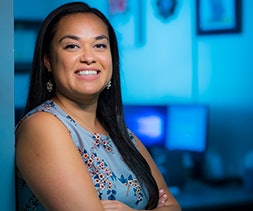It’s 3:24 am. I wake up, abruptly. Out of breath, in a cold sweat. A burning in my fingertips—an urgency to write. I reach for my journal on the night stand, and write in the shadow of darkness.
Two years ago, I surrendered my rage to my ancestors when academia told me I did not belong. Since then, my ancestors awaken me to document a collective story, especially during COVID-19. What is the one thing that COVID-19 and academia have in common?
 Dr. Nichole Margarita Garcia
Dr. Nichole Margarita GarciaDeath.
Communities of Color, especially Black and Latinx, have disproportionately experienced physical death. In academia, social and emotional death are reoccurring for students, staff, administrators, adjuncts, and faculty across the board. When combined, Communities of Color are consistently reminded of the structural violence against us. We have lost brilliant People of Color during this time. Memory is a hard thing to reckon with especially from a place of loss and rage. To write memory from rage requires an enormous amount of vulnerability and intimacy. The past year I stopped writing blogs out of fear of what I might say and the consequences that would follow.
The Rage of Silence.
As bell hooks articulates “killing rage” or in other words to repress our rage as People of Color, is an act of removal, as if “rage has no place in anti-racist struggle.” Once we see ourselves as victims, as People of Color in a White supremacist society, “we surrender our rage.” hooks radicalizes rage to have vast implications in the anti-racist struggle and once reclaimed can lead to constructive change and healing. As People of Color we have a right to our rage as it can be used as a tool to recover memory and stories.
Finally, hooks expresses, “sharing rage connects those of us who are older and more experienced with younger black and non-black folks who are seeking ways to be self-actualized, self-determined, who are eager to participate in anti-racist struggle.” Most recently, I shared with my dear friend and colleague Dr. Omaris Z. Zamora, my rage. My aunt died from COVID-19 and when I requested extensions, I was not met with a favorable response. I experienced a complete dismissal of what I was experiencing, followed by, “so when can you get me the manuscript?”
Dr. Zamora told me I was grieving. She reminded me that grief does not require an outcome, it requires a process, to honor all that was and remains. Our future is what we make it and it is in our hands to decide—tell the story you know. After cries followed by laughter, she said, “You better cite me!” We do more than cite one another, we are in the process of (re)imagining our grief and rage so that one day we document our silence. It is my hope that others, like myself, are (re)imagining and dreaming with loved ones through these difficult times. Until then, breathe your rage.
Dr. Nichole Margarita Garcia is an assistant professor of Higher Education at Rutgers University, New Brunswick. You can follow her on Twitter @DrNicholeGarcia
















